Amazon's First Quarter: Sales Jump 33%, Stock Jumps 14%
 In the first quarter ended March 31, net sales at Amazon.com rose 33.3%, to $13.2 billion and net income fell 35.3%, to $130 million.
In the first quarter ended March 31, net sales at Amazon.com rose 33.3%, to $13.2 billion and net income fell 35.3%, to $130 million.
Despite the drop in net income, Wall Street liked the jump in net sales, which was above its forecasts, and in after-market trading yesterday, Amazon shares rose nearly 14%, to $224.
The company attributed much of the sales gain to digital products, saying that in the quarter, "nine out of 10 of the top sellers on Amazon.com were digital products--Kindle, Kindle books, movies, music and apps." It called the Fire tablet "the #1 bestselling, most gifted, and most wished for product across the millions of items available on Amazon.com since launch" and stated that "16 of our top 100 bestselling titles" on the Kindle store were exclusive titles.
In a conference call, CFO Tom Szkutak said, "Kindle and the total digital business is growing very strong." He also said customers are buying "a lot of content."
The drop in net income came in large part because the company has continued to invest in new distribution centers and new products like the Kindle Fire. Observers believe that the Fire is priced below Amazon's costs.
As the Wall Street Journal noted: "Investors, who have in the past groused over Amazon's high spending, appear inured to the company's expenditures and instead focused on its growth."
And the New York Times wrote: "Throughout its 15-year history as a public company, Amazon has at times caused fits among analysts with its willingness to invest heavily in initiatives that erode the company's profits, with the promise that those seeds will eventually turn into a bounty the company can harvest in the years to come. That cycle, though, has repeated itself often enough that Amazon's skeptics believe it is a permanent state of affairs, indefinitely depressing Amazon profit.... Jeff Bezos has been unapologetic about that approach, saying the company favors serving a huge audience of customers while delivering thin profit margins to investors over producing bigger profits from a smaller audience."
In its announcement about quarterly results, the company was cagey, as usual, about some statistics, but said:
Sales for the U.S. and Canada rose 36%, to $7.4 billion.
Sales in the rest of the world rose 31%, to $5.8 billion.
Sales of media worldwide grew 19%, to $4.7 billion.
Sales of "electronic and other general merchandise" worldwide grew 43%, to $8 billion.
Amazon predicted that net sales in the second quarter will grow in a range of 20%-34%, to between $11.9 billion and $13.3 billion.





SHELFAWARENESS.1222.S1.BESTADSWEBINAR.gif)



 The online sales tax debate became a bit murkier Wednesday when Cook County Circuit Judge Robert Lopez Cepero said in court that the
The online sales tax debate became a bit murkier Wednesday when Cook County Circuit Judge Robert Lopez Cepero said in court that the 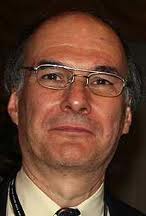 In Bookselling This Week, American Booksellers Association CEO
In Bookselling This Week, American Booksellers Association CEO SHELFAWARENESS.1222.T1.BESTADSWEBINAR.gif)
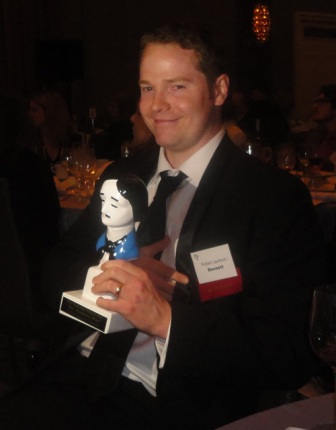 The Mystery Writers of America held its annual Edgar Awards ceremony at New York City's Grand Hyatt Hotel last night, with Mo Hayder's Gone winning for Best Novel and Lori Roy's Bent Road taking the prize for Best First Novel. The award for Best Paperback Original went to Robert Jackson Bennett (r.) for The Company Man, a prize he received enthusiastically while conceding he'd hadn't been expecting his science fiction novel to win.
The Mystery Writers of America held its annual Edgar Awards ceremony at New York City's Grand Hyatt Hotel last night, with Mo Hayder's Gone winning for Best Novel and Lori Roy's Bent Road taking the prize for Best First Novel. The award for Best Paperback Original went to Robert Jackson Bennett (r.) for The Company Man, a prize he received enthusiastically while conceding he'd hadn't been expecting his science fiction novel to win.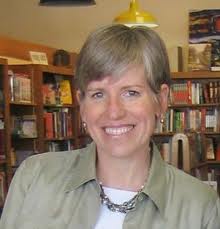 "Having a system in place relieves us of assessing all of the books, and it relieves us of the responsibility of having to respond to every single self-published author," said Sarah Bagby, owner of
"Having a system in place relieves us of assessing all of the books, and it relieves us of the responsibility of having to respond to every single self-published author," said Sarah Bagby, owner of 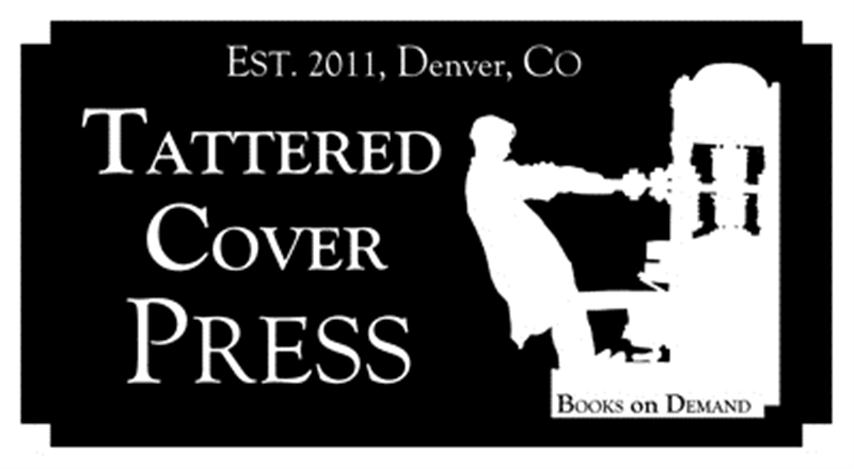 Matt Miller, general manager of the
Matt Miller, general manager of the 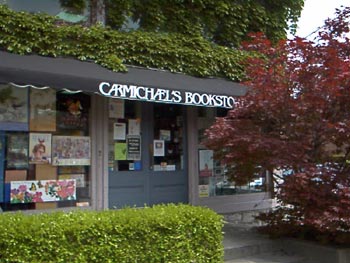 Carol Besse, owner of
Carol Besse, owner of  Working with local authors is "a big part of what we do," according to Heather Lyon, owner of
Working with local authors is "a big part of what we do," according to Heather Lyon, owner of 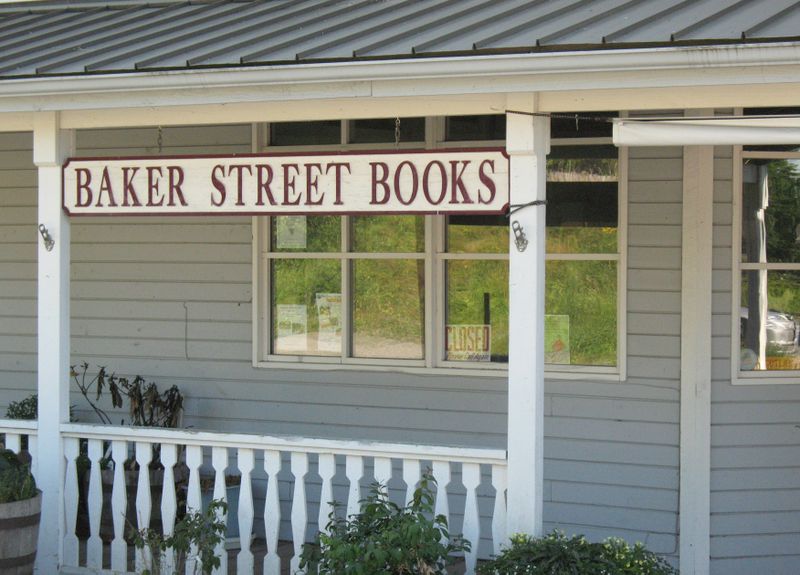 In a plot twist worthy of Arthur Conan Doyle, patrons of Baker Street Books, Black Diamond, Wash., gathered last Sunday "to mourn its closure, celebrate the joy the business had brought to the community as well as its owner, when it was announced that Kent resident Todd Hulbert was the white knight who had
In a plot twist worthy of Arthur Conan Doyle, patrons of Baker Street Books, Black Diamond, Wash., gathered last Sunday "to mourn its closure, celebrate the joy the business had brought to the community as well as its owner, when it was announced that Kent resident Todd Hulbert was the white knight who had 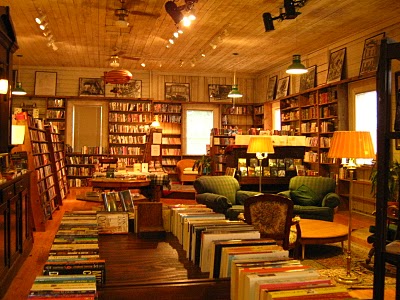 Charles announced in March that the store would close. "I had been thinking about it the past six or seven months, business had been going down because of the economy and people switching to e-books," he recalled. "Then on March 8 I took a tumble and fell on my back. I like to joke that the bookstore was getting even with me."
Charles announced in March that the store would close. "I had been thinking about it the past six or seven months, business had been going down because of the economy and people switching to e-books," he recalled. "Then on March 8 I took a tumble and fell on my back. I like to joke that the bookstore was getting even with me." Volunteer-run radical and progressive bookstore
Volunteer-run radical and progressive bookstore 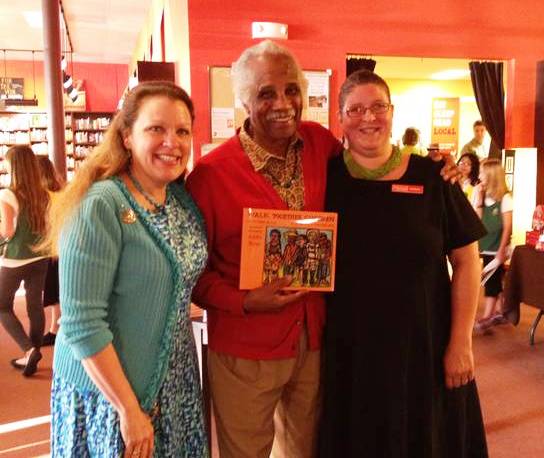

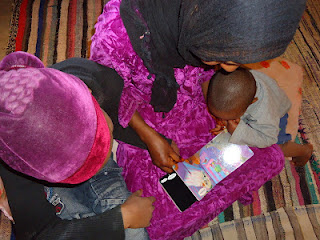 "But there are individuals, of course, who are fascinated by books. I'm speaking mainly of children who, like children everywhere, thirst for stories--stories that help explain their own lives to them but also, in [Ann] Patchett's words, help them imagine lives other than their own. And there a few adults, too. In my village, I've found one so far (there may be others)--Fatima, one of my host sisters. In February, on my return from the Marrakesh Marathon, I gave Fatima and Sulayman, my 6-year-old host nephew, each a book in Arabic--the first book either of them had ever owned. So that was my World Book Day, I suppose.
"But there are individuals, of course, who are fascinated by books. I'm speaking mainly of children who, like children everywhere, thirst for stories--stories that help explain their own lives to them but also, in [Ann] Patchett's words, help them imagine lives other than their own. And there a few adults, too. In my village, I've found one so far (there may be others)--Fatima, one of my host sisters. In February, on my return from the Marrakesh Marathon, I gave Fatima and Sulayman, my 6-year-old host nephew, each a book in Arabic--the first book either of them had ever owned. So that was my World Book Day, I suppose.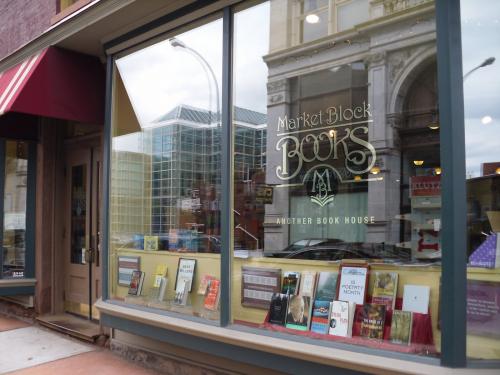 Beginning at 6 p.m. tonight, local author Amy Halloran will be the "
Beginning at 6 p.m. tonight, local author Amy Halloran will be the "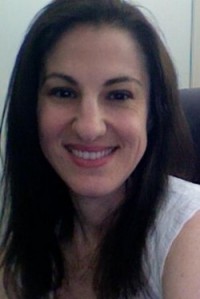
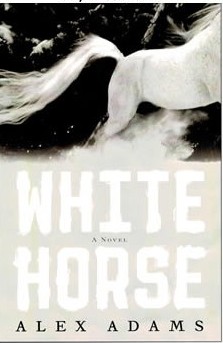 Your top five authors:
Your top five authors: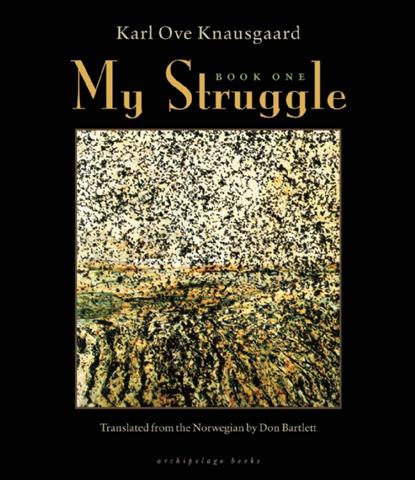 It's a lucky reader who gets buried alive in the literary avalanche of Karl Ove Knausgaard's My Struggle--a free-wheeling, funny, smart, provocative chunk of narrative that just keeps on coming, a flashback-laced plunge into one man's life, with memories within memories rattled off like a simpler, friendlier modern-day Proust. Instead of dissecting elderly dukes and princesses, however, Knausgaard perceptively and comically describes middle-class teenagers and young married couples with kids. And this compulsively readable Norwegian magnum opus is just the first of six volumes.
It's a lucky reader who gets buried alive in the literary avalanche of Karl Ove Knausgaard's My Struggle--a free-wheeling, funny, smart, provocative chunk of narrative that just keeps on coming, a flashback-laced plunge into one man's life, with memories within memories rattled off like a simpler, friendlier modern-day Proust. Instead of dissecting elderly dukes and princesses, however, Knausgaard perceptively and comically describes middle-class teenagers and young married couples with kids. And this compulsively readable Norwegian magnum opus is just the first of six volumes.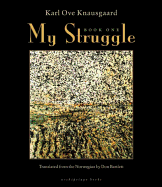
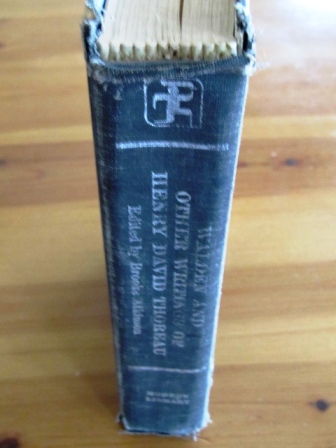 Let me introduce you to my rattiest book: Walden and Other Writings of Henry David Thoreau, a Modern Library edition I bought new one summer during my college years--probably in 1969 or 1970. At the time, Thoreau mattered more to me than almost anyone, living or dead. I made pilgrimages to Concord, visited Walden Pond and tried to ignore the beachgoers; left a pebble at his grave in Sleepy Hollow Cemetery. I carried Walden in my Army surplus knapsack every day then, opened it constantly like a holy book, and over a relatively brief period of time beat it to within an inch of its biblio-life.
Let me introduce you to my rattiest book: Walden and Other Writings of Henry David Thoreau, a Modern Library edition I bought new one summer during my college years--probably in 1969 or 1970. At the time, Thoreau mattered more to me than almost anyone, living or dead. I made pilgrimages to Concord, visited Walden Pond and tried to ignore the beachgoers; left a pebble at his grave in Sleepy Hollow Cemetery. I carried Walden in my Army surplus knapsack every day then, opened it constantly like a holy book, and over a relatively brief period of time beat it to within an inch of its biblio-life. 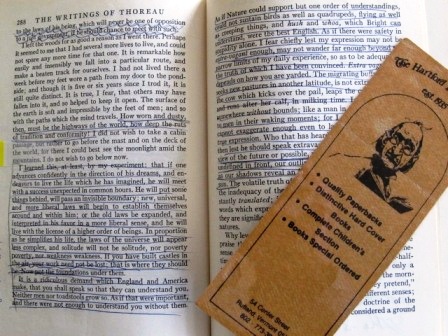 Now I open my copy of Walden to the same bookmarked page and wonder when I first put that marker there and why. I read a few lines: "I learned this, at least, by my experiment: that if one advances confidently in the direction of his dreams, and endeavours to live the life which he has imagined, he will meet with a success unexpected in common hours." I liked to underline passages then. Here more of the page is highlighted than not. Guess I grew more selective over the years.
Now I open my copy of Walden to the same bookmarked page and wonder when I first put that marker there and why. I read a few lines: "I learned this, at least, by my experiment: that if one advances confidently in the direction of his dreams, and endeavours to live the life which he has imagined, he will meet with a success unexpected in common hours." I liked to underline passages then. Here more of the page is highlighted than not. Guess I grew more selective over the years.